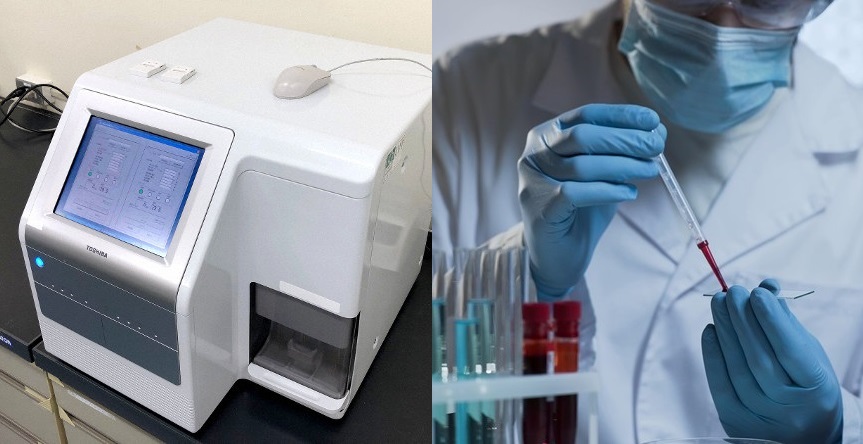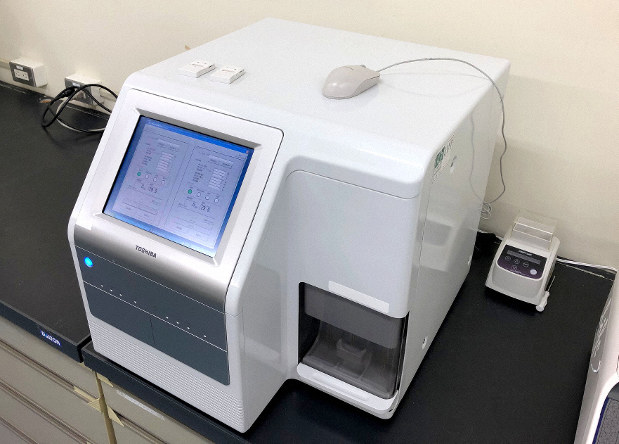With Just A Single Drop Of Blood, This Machine Can Detect 13 Different Types Of Cancer
Harin - Nov 27, 2019

Toshiba revealed that it has created a new device capable of detecting 13 different types of cancer with just a drop of blood with an accuracy rate of 99%.
- Scientists “Teleport” Gold Nanoparticles Into Cancer Cells To Destroy Them
- This Guy Turned A 90YO Typewriter Into An EDM Drum Machine To Play Music And It's Awesome!
- This Ridiculous, Useless Machine Takes Longer Than A Lifetime To Complete One Rotation
On November 25, Toshiba, the popular Japanese enterprise, revealed that it has created a new device capable of detecting 13 different types of cancer with just a drop of blood with an accuracy rate of 99%.
This revolutionary device is the result of a collaboration between Toshiba and the National Cancer Center Research Institute and Tokyo Medical University. This machine is scheduled to be on the market in the next few years after it undergoes its trial which begins next year.
How the machine can detect blood is quite cool. The researchers and scientists behind this machine have designed it to examine microRNA molecules’ type and concentration from cancerous cells.

Koji Hashimoto who is a chief research scientist at the Frontier Research Laboratory of Toshiba said in a statement that when comparing their new method with other companies’ methods in cancer detection, it is better, in terms of accuracy rate, the time needed for detection as well as the cost.
This new device from Toshiba can detect glioma, sarcoma, and cancers like bladder, breast, prostate, ovarian, biliary tract, bowel, liver, pancreatic, lung, esophageal, and gastric.
Not only the machine can revolutionize cancer detection, making it more accurate, it is also not too costly.
However, this is not the first time for scientists to have found methods in detecting cancer efficiently and swiftly. In 2018, the University of Queensland scientists came up with a universal cancer test that made use of a simple color-changing watery substance to reveal malignant cells’ presence in the body. It took no more than 10 minutes for the test to be completed.
The test is based on a simple fact that cancer DNA and normal DNA adhere to metal surfaces differently. If a patient has cancerous cells in their body, the bloodstream is where these cells travel through. With this test, even tiny traces of malignant cells are checked. This method seems not to be as practical as the machine from Toshiba, it is still a game-changing method nonetheless.
Featured Stories

Features - Jan 29, 2026
Permanently Deleting Your Instagram Account: A Complete Step-by-Step Tutorial

Features - Jul 01, 2025
What Are The Fastest Passenger Vehicles Ever Created?

Features - Jun 25, 2025
Japan Hydrogen Breakthrough: Scientists Crack the Clean Energy Code with...

ICT News - Jun 25, 2025
AI Intimidation Tactics: CEOs Turn Flawed Technology Into Employee Fear Machine

Review - Jun 25, 2025
Windows 11 Problems: Is Microsoft's "Best" OS Actually Getting Worse?

Features - Jun 22, 2025
Telegram Founder Pavel Durov Plans to Split $14 Billion Fortune Among 106 Children

ICT News - Jun 22, 2025
Neuralink Telepathy Chip Enables Quadriplegic Rob Greiner to Control Games with...

Features - Jun 21, 2025
This Over $100 Bottle Has Nothing But Fresh Air Inside

Features - Jun 18, 2025
Best Mobile VPN Apps for Gaming 2025: Complete Guide

Features - Jun 18, 2025
A Math Formula Tells Us How Long Everything Will Live
Read more

ICT News- Feb 18, 2026
Google's Project Toscana: Elevating Pixel Face Unlock to Rival Apple's Face ID
As the smartphone landscape evolves, Google's push toward superior face unlock technology underscores its ambition to close the gap with Apple in user security and convenience.

Mobile- Feb 17, 2026
Anticipating the Samsung Galaxy S26 and S26+: Key Rumors and Specs
The Samsung Galaxy S26 series is on the horizon, sparking excitement among tech enthusiasts.

Mobile- Feb 16, 2026
Xiaomi Launches Affordable Tracker to Compete with Apple's AirTag
For users tired of ecosystem lock-in or high prices, the Xiaomi Tag represents a compelling, no-frills option that delivers core functionality at a fraction of the cost.
Comments
Sort by Newest | Popular